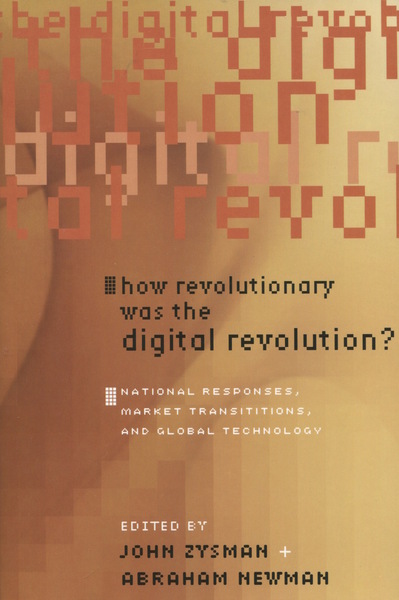
2006
504 pages.
from $55.00
Paperback now $27.50 (50% off)
Hardcover ISBN: 9780804753340
Paperback ISBN: 9780804753357
How do high wage countries stay rich in a global digital economy? How Revolutionary was the Digital Revolution constructs a framework for analyzing the international digital era: one that examines the ability of political actors to innovate and experiment in spite of, or perhaps because of, the constraints posed by digital technology.
In order to assess the revolutionary nature of the digital era, this book takes four overlapping approaches. First, it examines the reaction of nations, specifically Finland, Japan, and emerging markets, to the dual challenges of globalization and technological change. This section identifies both successful and failed national experiments intended to deal with these dual pressures. Second, it assesses corporate attempts to leverage digital technology to reorganize work. A broad range of issues including off-shoring, open source production systems, and knowledge management are addressed. Third, devoting detailed analysis to the case of mobile telephones, the book offers insights into the political economy of market evolution in the digital era. The final section considers the political ramifications of information technology for critical societal debates ranging from privacy to intellectual property.
The contributors to the book map out how the digital revolution shakes up politics, creating new economic and political winners and losers. In order to do so, they connect theories of political economy to the implications of digital technology for international as well as national markets.
About the authors
John Zysman is Professor of Political Science at the University of California, Berkeley and Codirector of the Berkeley Roundtable on the International Economy (BRIE). Abraham Newman is Assistant Professor at the Edmund Walsh School of Foreign Service, Georgetown University and Research Associate at BRIE.
"This wide-ranging volume is essential reading for anyone interested in the ongoing structural transformations and future challenges posed by information and communication technology (ICT) in Europe, the U.S., and Asia. The book provides extremely important insights into the political economy of the global digital era and helps us understand the interplay of technology, corporate strategy, and public policy. Understanding this interplay at all levels—corporate, national, and international—is the key to fully utilizing the potential of ICT and to enhance long-term economic growth."
—Erkki Liikanen, Governor, Bank of Finland, Former Commissioner for Enterprise and Information Society of the European Union
“This outstanding volume provokes reflection on the vast changes in the world economy caused by the digital revolution. The editors and the authors provide not only facts but creative ideas: fresh thoughts about how to understand the relationship among technology, corporate strategy, public policy, and the global marketplace. It differentiates among what is global and what remains distinctively national. This book should be read by everybody interested in important issues concerning employment, wealth, and power. It helps redefine the ‘conversation’ we are having about globalization.”—Peter Gourevitch, University of California, San Diego
“This book looks at the digital revolution from a number of perspectives, providing an essential reflection on an important topic. Which aspects of corporate strategies, national institutions, and technology investments led to major successes, and which did not? The book addresses these questions by examining specific cases using multiple disciplinary approaches. It provides valuable insights into the future evolution of the economy, technology, and business strategy, not just recent history. Read it.”—Stuart I. Feldman, Vice President, Computer Science, IBM Research